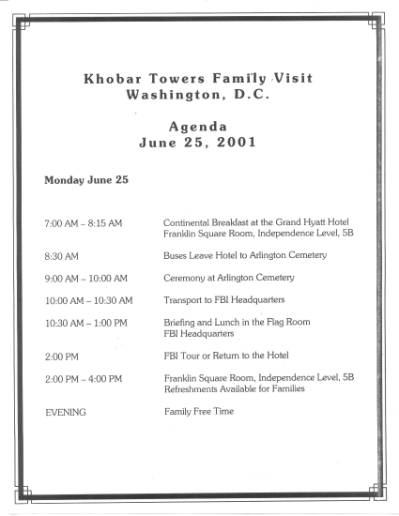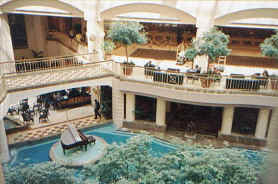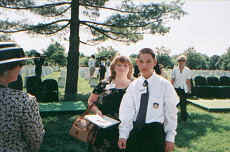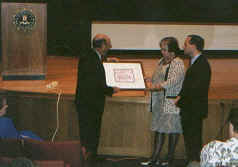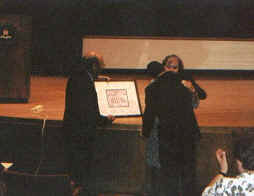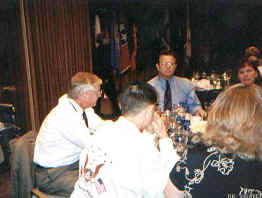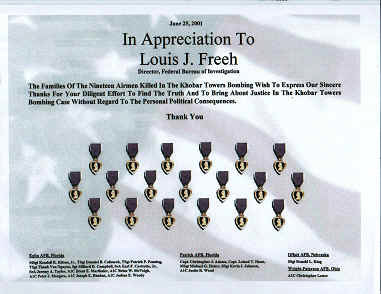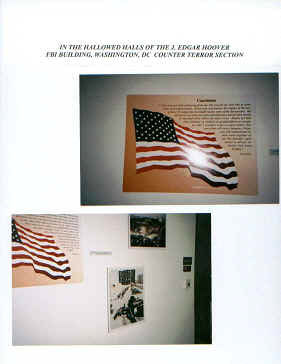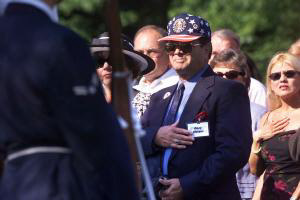|
|
After almost a year of careful planning and coordination, we were guests of the Department of Justice who reserved rooms for us in The Grand Hyatt Hotel to make us as comfortable as possible on such an uncomfortable occasion. The itinerary looks simple but it was a carefully coordinated plan carried out flawlessly. The ceremony at Arlington National Cemetery with Secretary Peters as moderator was lovingly planned by Carmella LaSpada and the No Greater Love organization. The briefings at the J Edgar Hoover building were conducted by FBI legal staff and we felt honored that Mr. Louie Freeh was included inasmuch as he had stepped down as Director only a few weeks earlier. He spent some quality time with the families and we showed our appreciation in the form of a few token gifts. He told us the agency is committed to this case and wants to see justice served. He also told us again he is a policeman and not a politician. It’s no wonder we get along so well! |
|||||||||||||||
|
|
Tremendous group effort by the AF, FBI, NGL & DOJ!
|
|||||||||||||||
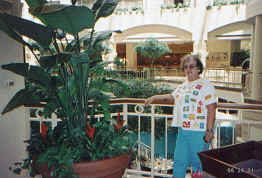 |
||||||||||||||||
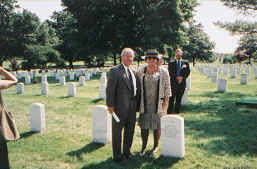 |
Mike
Rolince, FBI Head of Counter Intelligence Division
|
|||||||||||||||
|
Mr. Peters
introduces the distinguished guests.
|
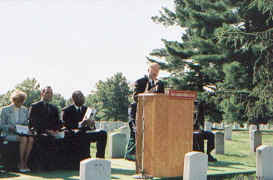 |
|||||||||||||||
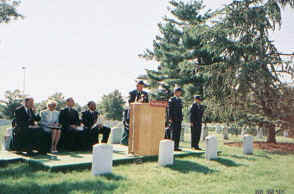 |
A solemn ceremony conducted with such feeling | |||||||||||||||
| Whit Peters observes while Louie Freeh assists with wreath | 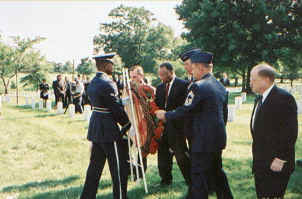 |
|||||||||||||||
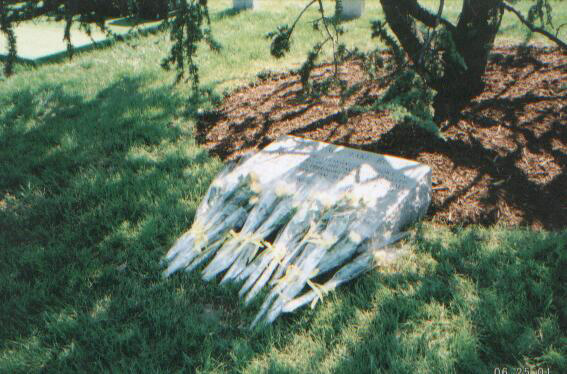 |
19 beautiful yellow roses were placed by ‘the tree’. The roses are to honor 19 Fallen Heroes. The tree is to remember all victims of all acts of terrorism and is in a specially designated area at Arlington, Section 59. | |||||||||||||||
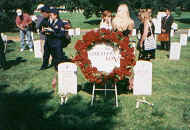 |
Carmella thought of everything, even soft music | 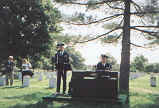 |
||||||||||||||
|
|
Family members mingled and met with media after the ceremony. For some family members it was a first time meeting. For others, we wiped our tears and reflected over the past long empty years and we wondered how we made it. We all agreed we are ‘doing better’. Apparently we are. We are the survivors! | |||||||||||||||
|
|
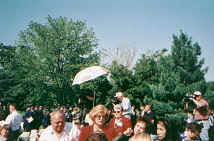 |
|||||||||||||||
|
A while after the ceremony our Air Force bus took us to FBI Headquarters, the J. Edgar Hoover Building. |
||||||||||||||||
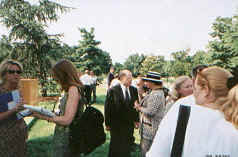 |
We sat through briefings and were served a nice catered luncheon followed by an escorted tour of the building with a final stop, at none other than the gift shop. | |||||||||||||||
|
Things for Louie to remember us by. At Right-George Beekman and Fran present The Purple Hearts.
|
|
|||||||||||||||
|
|
Hugs for Fran from Louie. Wow! He knew I was facing major brain surgery and made the effort to be part of this event. Actually, it was the best medicine anyone could offer! (even if the doctors didn’t agree at the time) Sometimes the patient knows best. |
|||||||||||||||
|
Dawn Woody and Bridgette Brooks present Louie with a framed remembrance that was signed by each Khobar Towers surviving family member.
|
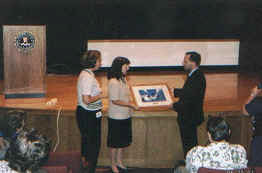 |
|||||||||||||||
|
|
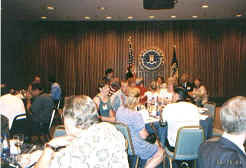 |
|||||||||||||||
|
|
||||||||||||||||
|
The
‘Conclusion’ was a shock to
read as it is a quote from an early
letter written to Director Freeh from Fran. He took it to heart,
and the agency uses it for training purposes. This was pointed out to us
while on tour. |
||||||||||||||||
|
|
||||||||||||||||
"When
you are an only child that loses your only child, you never
forget," said Fran Heiser of Palm Coast. Her son was one of
five from Patrick Air Force Base to die in the attack. "You
feel lost." A
bugler sounded taps, the military hymn so often heard on this
historic Virginia hillside with its sweeping view of the Potomac
River and other grand monuments to democracy that rise from its
banks. A
brilliant morning sun heated the June air as guests and officials
gathered in a part of the cemetery where pine and cedar trees
offered shade and memories of lost sons, fathers and husbands are
thick. For
the Heisers and other families, five years and Monday's ceremony
could do little to ease the pain. The long-planned memorial was
made all the more poignant by last week's federal grand jury
indictment charging 14 members of the Islamic militant group
Hezbollah with the bombing. In
a brief graveside speech, former FBI Director Louis Freeh said the
indictments were partial fulfillment of a promise federal
officials made to the victims' families. "We
made a promise to you in 1997, a promise we won't forget,"
Freeh said. "We will pursue this matter to whatever end,
whatever consequence." The
indictments were welcomed news but victims' families see them as a
beginning, not an end. "We
need answers," said Jenny Haun of Cocoa Beach, whose husband,
Air Force Capt. Leland "Tim" Haun, was killed in the
blast. Haun
credited Freeh for taking a deep professional and personal
interest in the Khobar Towers bombing investigation. Freeh
sought to reassure family members about the FBI's investigation. "I'm
not a diplomat. I'm not a politician. I'm a policeman, and that's
how I conducted this case," Freeh said. Some
of the 14 indicted individuals are in Saudi custody. "This
is just the beginning," said Gary Heiser, who sat with his
wife in front row chairs just feet from the headstone marking
their son's grave. Young
Kevin Johnson Jr., 9, whose father, Staff Sgt. Kevin Johnson, was
killed in the Khobar blast, bravely helped lead the Pledge of
Allegiance during the memorial. "Five
years is a long time," said Shyrl Johnson of Melbourne, who
has been raising Kevin Jr. and his two brothers on her own since
1996. "I'm hoping it won't take another five years before
they are able to bring them (those responsible for the bombing) to
justice." The
nonprofit organization No Greater Love organized Monday's
ceremony. The group is dedicated to providing annual programs of
remembrance for the families of Americans who died while serving
the nation or by acts of terrorism. In
a statement read at the ceremony, Attorney General John Ashcroft
pledged to pursue the prosecution of the indicted individuals
despite continued Saudi reluctance to deport the alleged
conspirators. |
||||||||||||||||
|
||||||||||||||||
